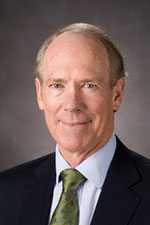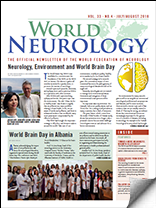By William Carroll
WFN President
The WFN and WHO share a number of common features and have had useful collaborations in the recent past. Both organizations have a global perspective with regional organizations, parallel mission and goals, and the development of the Atlas of Neurology and the neurology section of the 11th revision of the International Classification of Disease (ICD11) to its present stage.

William Carroll, MD
In addition, the WHO and WFN have collaborated during the Zika virus Public Health Emergency of International Concern of 2016, and the recognition of stroke as a disease of the brain and dementia and on other degenerative neurological disorders being included in the WHO non-communicable disease (NCD) initiative. The two organizations diverge only in the magnitude of the tasks confronting them.
The WFN mission is to foster quality neurology and brain health worldwide; the WHO to improve equity in health, reduce health risks, promote healthy lifestyles and settings, and respond to the underlying determinants of health. Arguably, the two organizations are a natural fit with the potential for beneficial cooperative activity. Both have regional organizations of similar geographic distribution pursuing the same goals as above. For the WHO, member states are grouped into six regions: African, the Americas, South-East Asian, European, Eastern Mediterranean, and Western Pacific. WFN member societies are in five regions; the American (represented by the American Academy of Neurology and the Canadian Neurological Society) and the Pan American Federation of Neurological Societies, representing Central and South American members, the European region comprising the European Academy of Neurology, the Middle East and North African region represented by the Pan Arab Union of Neurological Societies, the African region represented by the newly formed African Academy of Neurology, and the Asia Pacific region represented by the Asian and Oceanian Association of Neurology.
DRAFT AGENDA
1300–1305
Introduction and welcome to delegates by the President, Dr. William Carroll (BC)
1305–1320
Roll call and proxies Dr. Wolfgang Grisold (SG)
1320–1325
Minutes of the COD Meeting in Kyoto 2017 (BC)
1325-1345
Presentation of the WCN 2023 intending candidate venues (5 minutes each)
a. Canada, Montreal
b. Mexico
c. Brazil
1345-1355
Receipt of Annual Report 2017
President’s report (WHO, GNA, Brief Dubai, Needs Registry)
1355-1405
First Vice President’s report (RK)
WCN 2019 progress report
1405-1415
Secretary General’s report (WG)
London Office
Overview
1415-1425
Treasurer’s report (RST)
Receipt of the accounts of the Federation for the financial year
Dec. 31, 2017.
Appointment of auditor.
1425-1450
Election: Candidate statements (5 minutes each)
Secretary General
Wolfgang Grisold
Elected Trustee
Morris Freedman
Alla Guekht
Jean-Marc Leger
Daniel Truong
1450-1515
Election: Voting
Secretary General
Wolfgang Grisold
Trustee
First round voting
Second round voting
1515-1525
Education Committee Report (SL)
Continuum
Training Centres/Teaching courses
World Neurology
1525-1535
Membership Committee Report (MF)
1535-1545
Public Awareness and Advocacy Committee (WBD MW)
1545-1555
Publications Committee (Journals JE)
1555-1605
E-Communications Committee (WS)
1605-1615
Africa Education Report (RG)
1615-1620
AOB
1620-1625
Announcement of all voting results
Close
Draft agenda for the upcoming WFN council of delegates meeting in Berlin Tuesday, Oct. 9, 2018.
The WHO is the lead organization for all matters in health.Its constituency is the national health organizations representing national governments in most instances.
The WHO does interact with many non-governmental organizations termed “non state actors” but it recognizes only one type of formal relationship known as “official relations.” Other informal contact includes “working relations” which have their own set of criteria. Official relations are usually between the WHO and global organizations which share common goals as does the WFN. Further, “official relations” is conferred by the WHO for a specified period and for designated topics. The WFN has greatly appreciated having “official relations” status for its partnership in the Atlas of Neurology and with the topic advisory neurology group for ICD-11 extended to 2019. It is the seemingly arbitrary nature of this collaborative effort and that the WHO does not have the same ready access to medical specialties and their global, regional, and national organizations as does the WFN for neurology and others such as the World Heart Foundation, the International Union of Immunological Societies and the International Society of Nephrology, that the WFN believes could be reviewed and probably optimized.
In the neurological sphere, it became apparent some years ago that there might be benefit in a closer alignment between two existing groups of “neurological” organizations. One roughly represented those with more specialty-focused neurological interests such as stroke (World Stroke Organization), epilepsy (International League Against Epilepsy), dementia (Alzheimers Disease International) movement disorders (International Parkinson and Movement Disorder Society ) and multiple sclerosis (Multiple Sclerosis International Federation). The other included those with neurologically related interests such as the World Federation of Neurosurgical Societies, the World Federation of Neurorehabilitation, the World Psychiatry Association, the International Child Neurology Association and the International Brain Research Organization.
During recent in-depth discussions with the WHO over ICD11 and the classification of stroke, these two groupings worked more closely than previously to the benefit of the WHO, the WFN, and members of these two groups. Emerging from this experience was a sentiment that had first been expressed during the meeting of representatives attending the WCN 2015 in Santiago; that a more formal unified structure interacting more regularly to share information, acting concertedly and advocating more cohesively could be mutually beneficial. This organization, at present in formal development, would be known as the Global Neurological Alliance (GNA).
It should bolster many areas to do with brain health not least by providing ready access to neurological specialties and speciality perspectives. In effect, it adds a valuable third dimension for the promotion of brain health by the WFN and GNA. Recognizing the role the WFN will play as the communication hub for this new alliance, the trustees have committed to provide the personnel and resources required to ensure its success.
The WFN has also recommitted to ensure all alliance members have the opportunity to participate in the biennial World Congress of Neurology; a practice developed by the immediate WFN past President. Finally, it is hoped that the WFN will be able to offer to GNA members free advertisements in World Neurology and on its website.
The immediate benefits of establishing the GNA are recognizable and have little or no risk to it or its members. These include a more influential voice in matters of advocacy, a more rapid response to global government and non-government calls for action, the provision of specialist task forces, the promotion of brain health in general, and the continued evolution of World Brain Day (WBD) in partnership with other GNA members.
WBD themes have been epilepsy and stroke in previous years, the environment this year, and headache for next year. Indeed, the risk of not proceeding to establish the GNA are possibly a greater threat to the common goals than doing so. Most importantly among tasks suitable for the GNA is the ability of the GNA to provide greater support for the WHO in its NCD and Air Pollution and Health initiatives, its global action plan for dementia, in addition to the call by the WSO for the WHO to increase awareness, treatment access, and removal of inequities in stroke care.
From my position, it is to be hoped that the ability to interact successfully at this global level will be facilitated by the WFN retaining “official relations” status with the WHO to pursue areas of common interest mentioned above and in the other major concern for us, that of the inequities of access to health care in general and neurological care in particular.
In closing, let me remind all member societies of the WFN AGM and COD meeting to be held 1 p.m. on Tuesday, Oct. 9, 2018, in the Ulm room City Cube Messedamm 26 in Berlin. A draft agenda for this meeting is provided on page 3. We must have sufficient member society delegates to be quorate in order to elect a trustee from the four excellent candidates. •
